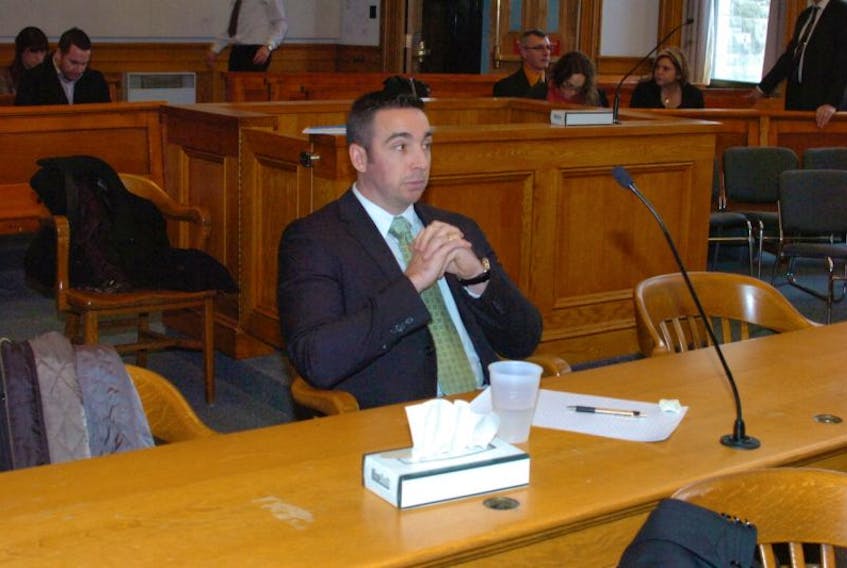An appeal has been allowed in the case of Royal Newfoundland Constabulary Const. Carl Snelgrove’s acquittal on charges of sexual assault, but the timing of a potential new trial depends on his rights due to the two-to-one decision.
Snelgrove, then 39, was found not guilty in February 2017 after a week-and-a-half-long trial on the allegation of sexually assaulting a 21-year-old woman while he was on duty on Dec. 21, 2014.
In the summary of the decision released Friday, Newfoundland and Labrador Supreme Court of Appeal justices Gale Welsh and Lois Hoegg agreed the Crown’s appeal of the acquittal should be allowed. Justice Charles White disagreed and argued for dismissal.
In the case of a dissenting opinion, the acquitted person has the right to appeal to the Supreme Court of Canada — the country’s highest court — and he has 30 days to decide whether to take that step.
So the Crown has to wait until after that time elapses before proceeding with a possible new trial. If Snelgrove doesn’t take that step, the Crown would arrange to have the case called back in Supreme Court to seek a new trial.
Snelgrove’s lawyer Randy Piercey wasn’t commenting Friday.
While two justices agreed with the Crown that the original trial judge did not instruct the jury the way the Crown wanted, Lloyd Strickland, the prosecutor in the Supreme Court trial, acknowledged Friday there’s also a unique legal issue at play regarding the specific section of the Criminal Code that addresses someone in a position of authority and consent.
“It’s an issue that hasn’t been really fleshed out or determined by a higher court in this country,” Strickland said.
“It’s never gotten much (Supreme Court of Canada) judicial attention for whatever reason.”
He said it’s unique enough that the Supreme Court of Canada might be interested in providing some guidance.
The question is at what point is there no consent and what are the circumstances, Strickland said in regard to such cases involving someone in authority and how the limits might be determined by a higher court.
St. John’s Status of Women executive director Jenny Wright said the province’s court of appeal decision is bittersweet.
On one hand, she said the decision gives the woman another chance at achieving justice.
But also, it puts the woman accusing Snelgrove and everyone involved potentially through another trial and lengthy legal process.
“My heart is broken for her and those affected by the trial,” Wright said.
“We’re all still processing what this all means.”
Wright noted the original verdict was disappointing for many in the community, who rallied quickly, an immediate backlash that she hadn’t seen in years.
“I think we are all shocked and appalled by the first verdict when he was found not guilty,” she said, adding the disappointment of many over how they felt his positon of authority and trust should have played in the outcome of the case.
(In the aftermath of the jury verdict in February 2017, a group of demonstrators staged a protest on the steps of the Supreme Court of Newfoundland and Labrador and there was a social media outcry.)
At issue in the Newfoundland and Labrador Supreme Court of Appeal was whether the trial judge erred in declining to instruct the jury on a section of the Criminal Code regarding consent and position of authority in her instruction to the jury.
Based on Snelgrove’s position as an on-duty police officer, the Crown requested that the trial judge include, in her charge to the jury, an instruction regarding the reduced value or nullification of consent based on abuse of the police officer’s position of trust or authority.
“The trial judge concluded that the necessary evidentiary foundation to engage (the relevant Criminal Code section) for consideration by the jury was absent because the complainant admitted that she could not remember much of what occurred that night due to her state of intoxication. Assuming that she had consented, which she conceded she may have done, the question of vitiation of that consent would fall to be considered given Mr. Snelgrove’s status as an on-duty police officer in uniform. The question is, did the trial judge err in refusing to include an instruction on section 273.1(2)(c) on the basis of the lack of an evidentiary foundation,” Welsh said in the decision.
Welsh said the instruction would have been warranted, however.
“I am satisfied that factual determinations, which were properly the responsibility of the jury, were required in order to determine whether (the section) may operate to vitiate the complainant’s consent. The trial judge erred by interfering with the function of the jury, and assessing the evidence rather than limiting her consideration to whether there was an evidentiary foundation requiring an instruction to the jury on vitiation of consent.”
Hoegg agreed with Welsh.
“When considering whether an alternate theory of liability ought to be put to a jury, a judge must exercise his or her gatekeeper role, and decide if there is evidence on which a properly instructed jury acting reasonably could convict. This is a question of law,” Hoegg said.
Hoegg also noted the jury came back to the trial judge during deliberations with the question “what happens if we do not all agree?”
“To my mind, this question indicates that the jury was struggling to reach a unanimous verdict,” she said.
However, Justice Charles White said the trial judge was correct in declining to put to the jury that in the absence of enough evidence of inducement, the fact he was in a position of authority is an inducement. That would be a bridge too far, he said.
“In order to convict Mr. Snelgrove on the basis of inducement the jury would have to conclude, in the absence of evidence of inducement, that the mere fact that Mr. Snelgrove was a police officer in uniform and on duty, was in and of itself enough to make an otherwise consensual sexual interaction a sexual assault,” White said.
“…The trial judge was clear in her view that it ‘would be unjust to suggest to the jury that they can infer inducement in these circumstances.’ She properly understood and fulfilled her role as gatekeeper.”
White also noted “While Mr. Snelgrove clearly exercised poor judgment in engaging in sexual activity with the complainant, there was no evidence that he abused his position to induce the complainant to engage in that sexual activity to warrant the trial judge instructing the jury” on the issue of abuse of authority.
According to evidence given at the trial, the woman testified that after a night of partying at a downtown bar, she was extremely drunk when she approached Snelgrove’s police car, which was parked on Water Street, and got a ride home.
She remembered some conversation on the way home and that she gave him directions.
She said that when they arrived, she and Snelgrove walked to the house, but she couldn’t find her keys and, with his help, she climbed in through a window and then let him in the door.
She said she couldn’t remember much of what happened because she was so drunk and it was so long ago, but the next thing she knew, he was having anal sex with her.
She said she remembers hearing him speak to her and seeing him walk to the bathroom to clean up.
She said Snelgrove didn’t use force on her.
She told the court that she had no intention of having sex with Snelgrove and that she just wanted to go home to sleep. She said she felt it would be safer to go with a police officer than in a taxi.
However, Snelgrove testified that she appeared fine when she approached the car and he didn’t see any signs of intoxication.
He said they talked all the way en route to her place in the east end of the city. The conversation included such topics as the police officers she knew, her friends, his job, her job and her aspirations to go back to school.
She also told him that she thought he was very attractive, he said. He said he returned the compliment and said she was cute or pretty.
He said she gave directions to where she lived.
When the woman said she couldn’t find her keys, Snelgrove offered to drive her to a friend’s house.
He said she had no problem getting in the window and then opened the door and invited him in.
He said he’s not sure why he went inside her place, but when he did, she made sexual advances and he responded.
He said the sex was consensual.









